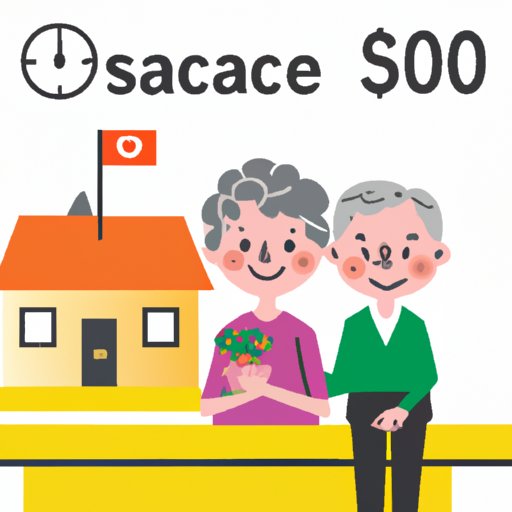Introduction
As people age, their physical health often declines, and they may require additional assistance with activities of daily living. Home care for seniors is an important part of ensuring that elderly individuals are able to remain in their own homes as long as possible. Home care services can include help with activities such as bathing, dressing, meal preparation, and medication management. This type of care can be provided by family members, friends, and professional caregivers.
In recent years, there has been an increasing focus on providing home care for seniors in many countries around the world. However, each country approaches this issue differently, with varying levels of government support, cultural norms, and cost of care. In this article, we will explore how different countries approach home care for seniors.
Comparative Analysis of Home Care Services in Different Countries
When it comes to home care for seniors, different countries have different approaches. To better understand how countries differ in their approach to home care, we must examine three key factors: government policies and regulations, cultural norms, and the cost of care.
Examining Government Policies and Regulations
The government plays a major role in determining the availability and quality of home care services for seniors. Governments typically set policies and regulations that govern the types of services that are available, as well as the qualifications of caregivers. Government funding and subsidies can also play a significant role in making home care more affordable for seniors.
Exploring Cultural Norms
Cultural norms also influence how different countries approach home care for seniors. For example, some cultures place a greater emphasis on family involvement in caring for elderly relatives, while others may rely more heavily on professional caregivers. Social attitudes towards aging can also vary widely across cultures, which can affect the level of respect and care that seniors receive.
Analyzing Cost of Care
The cost of home care for seniors can vary significantly from one country to another. In some countries, home care services may be free or heavily subsidized by the government, while in other countries, seniors may need to pay out of pocket for these services. Insurance coverage and financial assistance programs can also vary widely from one country to another.

Examining the Impact of Cultural Norms on Home Care for Seniors
Cultural norms can have a significant impact on the way home care for seniors is approached in different countries. Here, we will explore how traditional beliefs about senior care, social attitudes towards aging, and the role of family members can shape the availability and quality of home care services.
Traditional Beliefs about Senior Care
In some cultures, there may be strong beliefs that it is the responsibility of the family to care for elderly relatives. This can lead to families feeling obligated to provide care, even if they lack the resources or knowledge to do so properly. In addition, traditional beliefs about the role of seniors in society may lead to seniors being seen as less valuable and deserving of less respect than younger generations.
Social Attitudes towards Aging
Social attitudes towards aging can also affect how home care for seniors is approached in different countries. In some cultures, seniors may be viewed as wise and respected members of society, while in others, they may be seen as burdensome or even a source of shame. These attitudes can affect the level of care that seniors receive, as well as the resources that are devoted to providing home care services.
Role of Family Members
The role of family members in providing home care for seniors can vary significantly from one culture to another. In some cultures, family members may be expected to take on the primary responsibility for providing care, while in others, family members may be more likely to seek professional help. The availability of family members to provide care can also have a major impact on the availability of home care services.

Exploring Government Policies on Home Care for Seniors
Government policies can have a major impact on the availability and quality of home care services for seniors. Here, we will examine how governments approach home care, including benefits and subsidies, accessibility to services, and quality of care.
Benefits and Subsidies
Many governments provide benefits and subsidies to make home care services more accessible to seniors. These benefits may include financial assistance for those who cannot afford home care services, or subsidies to lower the cost of care. Governments may also provide tax credits or incentives to encourage family members to provide care.
Accessibility to Services
Governments also play a role in making home care services more accessible to seniors. This can include providing transportation services to get seniors to and from appointments, or ensuring that there are enough qualified caregivers available to meet the needs of seniors. Governments may also provide information and resources to help seniors find the best home care services for their needs.
Quality of Care
Governments also establish standards for the quality of care that is provided to seniors. These standards may include requirements for training and certification of caregivers, as well as guidelines for the types of services that are offered. Governments may also monitor and inspect home care services to ensure that they are providing safe and effective care.
Investigating the Role of Non-profit Organizations in Senior Home Care
Non-profit organizations can play an important role in providing home care services for seniors. Here, we will explore the types of services offered by non-profits, their funding sources, and the support programs they offer.
Types of Services Offered
Non-profit organizations typically provide a variety of services to help seniors remain in their own homes. These services can include help with activities such as meal preparation, medication management, and transportation. Non-profits may also provide companionship and emotional support, as well as educational programs to help seniors stay active and engaged.
Funding Sources
Non-profits typically rely on donations and grants to fund their services. They may also receive funding from government programs and foundations. Additionally, many non-profits offer fee-for-service programs, where seniors can pay for specific services.
Support Programs
Non-profits often provide support programs for seniors and their families. These programs can include counseling, respite care, and education and training for caregivers. Non-profits may also offer legal advice, advocacy services, and assistance with finding community resources.

Analyzing the Cost of Home Care for Seniors in Different Countries
The cost of home care for seniors can vary significantly from one country to another. Here, we will examine the variations in cost, insurance options, and financial assistance programs that are available to help seniors pay for home care services.
Variations in Cost
The cost of home care for seniors can vary widely from one country to another. In some countries, home care services may be free or heavily subsidized by the government, while in other countries, seniors may need to pay out of pocket for these services. Additionally, the cost of home care services can vary depending on the region, the type of services needed, and the level of care required.
Understanding Insurance Options
Insurance coverage for home care services also varies from one country to another. Some countries may provide universal health coverage that includes home care services, while others may only provide limited coverage. Additionally, some private insurance companies may offer supplemental coverage for home care services.
Financial Assistance
Financial assistance programs are also available in some countries to help seniors pay for home care services. These programs may include government subsidies, tax credits, or grants for those who cannot afford home care services. Additionally, some non-profit organizations may offer programs to help cover the cost of care.
Conclusion
Home care for seniors is an important part of ensuring that elderly individuals are able to remain in their own homes as long as possible. This article has explored how different countries approach home care for seniors, examining government policies, cultural norms, and cost of care. We have also investigated the role of non-profit organizations in senior home care.
In summary, we have found that government policies, cultural norms, and the cost of care can all have a major impact on how home care for seniors is approached in different countries. Additionally, non-profit organizations can play an important role in providing services and support to seniors. Further research is needed to better understand the differences in home care services across countries, and to identify ways to improve home care for seniors.
(Note: Is this article not meeting your expectations? Do you have knowledge or insights to share? Unlock new opportunities and expand your reach by joining our authors team. Click Registration to join us and share your expertise with our readers.)
